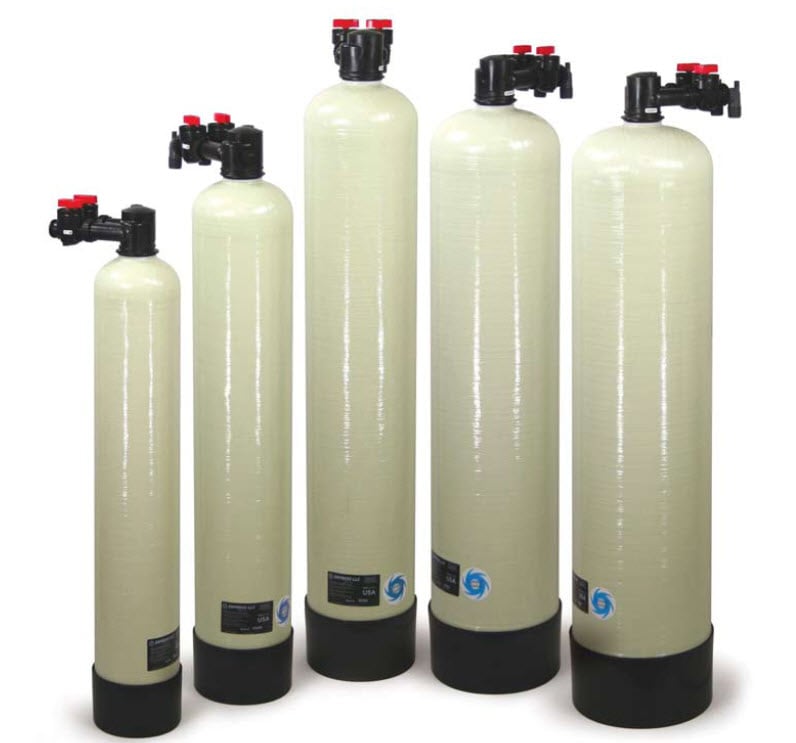Salt-free Water Conditioner


Enpress Vortech Tanks for use with Filtersorb filter media


Water softeners can be crucial components in a whole house well water filtration system. If you've experienced scale buildup and clogging of pipes and fixtures, your water is likely too high in magnesium and/or calcium content.
In other words, your water is too hard. A water softener will solve this problem fairly easily, but what kind of softener will you use?
When selecting a water softener for use in your home, you'll find that you have quite a few options. Before you begin selecting a water softener, you should first ask yourself whether you want to use a regular ion exchange water softener or a salt-free water conditioner. Both are equally effective, but there are some advantages to a salt-free conditioner.
Normal water softeners use ion-exchange media to remove hardness. An ion-exchange resin inside the softener attracts calcium and magnesium from the water and replaces them with sodium ions from the exchange resin. During regeneration (the process by which the softener's resin is cleaned and kept ready for use) saltwater is drawn from a brine tank into the softener to regenerate the sodium in the resin.
These systems will remove calcium and magnesium, thereby reducing scale and hardness deposits. However, they require some light maintenance and lead to increased sodium content in your water.
In comparison, salt-free water conditioners produce a catalytic reaction to convert calcium and magnesium in water to firm calcite crystals which are then carried away by the water flow once they reach a sufficient size (the nanometer range).
Thus, saltless water conditioners do not physically remove water hardness, but change the dissolved calcium carbonate into a type of calcite crystal that cannot attach to pipes or appliances to create hardness deposits. The treated water will gradually remove existing hardness deposits, as well.
No-salt water conditioners also require less maintenance than normal softeners because they don't need to be backwashed or regenerated – this makes them cheaper due to decreased water and energy usage and eliminates the need to replace the brine solution, further increasing your savings over a normal water softener.
Normal water softeners can be easily replaced by saltless conditioners, as well. You will see the same effects as with your normal softener, except that your water may not have that slippery, slimy feeling often reported with soft water because saltless conditioners don't remove hardness, but crystallize it.
You'll also notice the water will taste and feel better compared to standard sodium softened water due to the reduced concentration of sodium in the water.
For anyone considering a saltless water conditioner, we recommend the Scale Stopper Conditioner.
These no-salt conditioners come with a carbon whole-house filter, with the Vortech tank and can treat water hardness up to 50 grains per gallon, is available in five sizes, and is NSF-61 certified.
If you have any further questions about water softeners or other water filtration systems, e-mail us at support@cleanwaterstore.com, get in touch on Facebook, or use our online contact form, and we'll get back to you as soon as we can.
Read More: Hard Truths About Soft Water
Recent Posts
Water Quality for Horses and Livestock: A Guide to Healthier Barns and Pastures
Clean water is the cornerstone of animal health and productivity. Whether you're raising horses, cattle,…
Clean Drinking Water for Cats: What Every Cat Owner Should Know
Why Clean Drinking Water Matters for Cats Hydration is critical to a cat’s overall health,…
Pet Hydration: What to Know About Water Safety
Clean Drinking Water for Dogs: What Every Dog Owner Should Know Clean drinking water is…
How to Ensure Fresh, Safe Water for Your Birds: Daily Care Tips for Bird Owners
Why Filtered Water for Birds Is Essential for Their Health Like food, clean drinking water…
U.S. Water Problems by Region: Common Contaminants & Solutions
Curious about U.S. water problems by region? Water quality isn’t just a national issue—it’s a…
Wildfire Water Contamination: How to Ensure Safe Water After a Fire
Wildfire Water Contamination: What You Need to Know After the Fires Drinking water contamination is…
